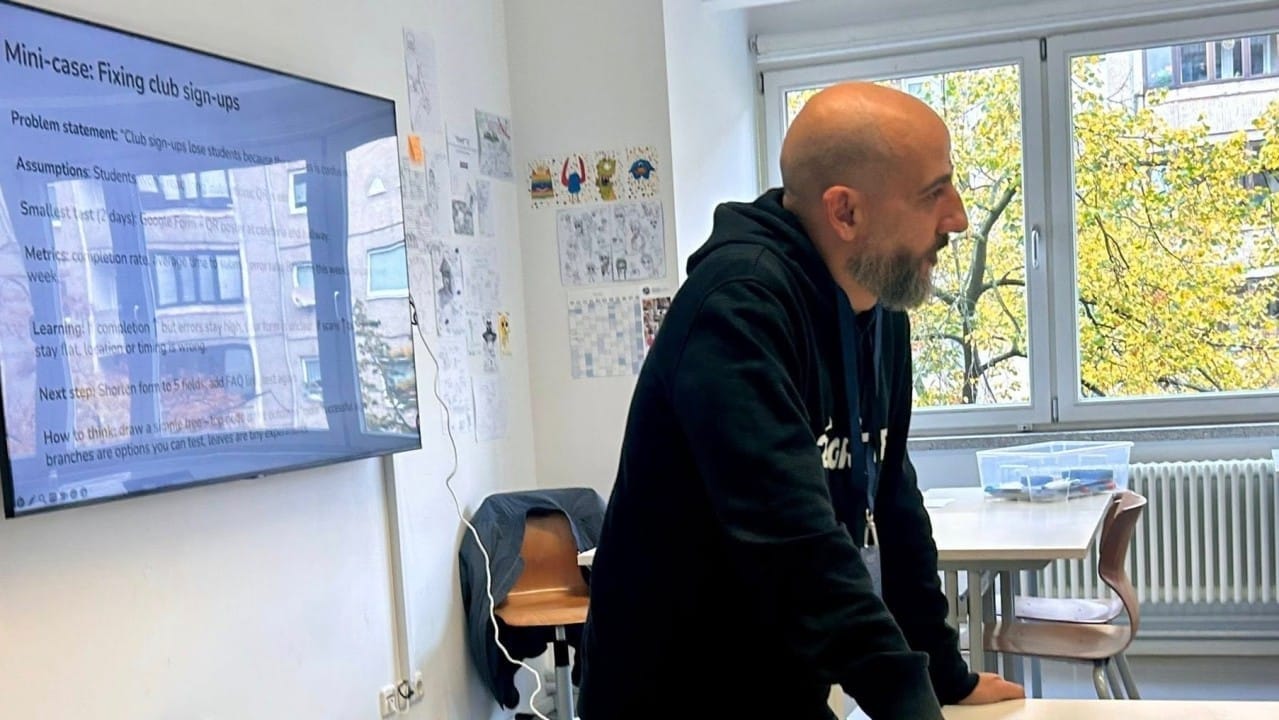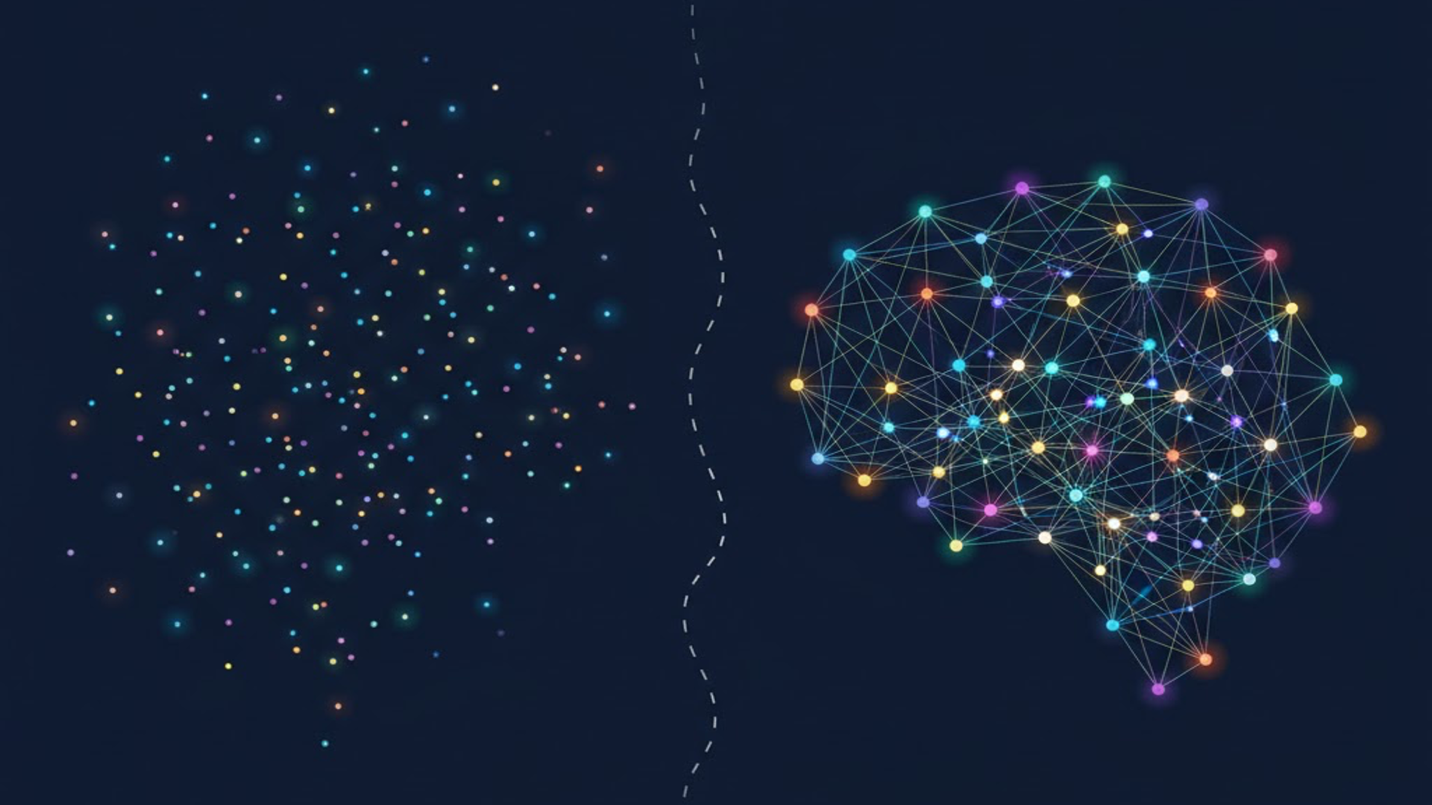Your Career Is a Story: Lessons From a 'Syntax Error'

I had the incredible opportunity to speak to a 9th-grade class for their Career Day. Instead of presenting a job title, I chose to share the journey. It was a wonderful exercise in reflection, reminding me that our careers are not ladders, but mosaics we build from curiosity, challenges, and a refusal to be just one thing. This was my message to them, and perhaps it will resonate with you, too.
[Views are my own]
Your Career Is a Story: Lessons From a 'Syntax Error' – The speech

Good morning. Thanks for having me.
Let's start with a question you’re probably already sick of hearing: 'What do you want to be when you grow up?”.
It is the wrong question. It forces you into one box and ignores two truths: you will change, and the world will change even faster.
The right questions are different. They sound more like this:
Which problems make you curious and feel worth solving?
What questions can’t you stop thinking about?
Worth solving means two things: it helps someone, and it matters to you.
Your career will be your quest to answer those questions. It will be a series of experiments you get to run your whole life.
Stop hunting the “perfect” job. Get great at learning, solving useful problems, and working with people. Choose problems, not job titles. Titles change, but the problems you care about will drive your whole life.
Now, when you start asking those new questions, you'll realize not all paths look like a straight road. Some are structured, like a blueprint for a surgeon or a lawyer. That path is valid and important.
But many others look more like a plate of spaghetti – winding, messy. Also valid. And to be clear, the blueprint path is not less creative. It's a different kind of quest, requiring immense focus and a deep, sustained curiosity.
My story is more a spaghetti story, and it's just one example of how this can work.
But today isn't about my map or your map. It’s about the engine you need to drive on any road you choose. That engine is built from two things: your curiosity and how you learn from setbacks.
The constant is learning, and learning never stops.
For me, the story of building that engine started with two simple words…
SYNTAX ERROR

Think about the last time you got something wrong. A math problem, a video game level, a line in a play.
Picture this: I’m seven years old. My parents give me my first computer. I turn it on. A white screen with blue letters appears: READY. Waiting for my prompt. I have no idea what to do, but computers must have a language. I type the most universal greeting I know: HELLO. I hit Enter. The screen replies: SYNTAX ERROR.
My first conversation with a computer, and I’d already messed up. It didn’t understand me. I wasn’t crushed. I was fascinated. Hooked. That error wasn’t failure: it was an invitation. It sparked the question that has driven my life:
How does this actually work?
Your SYNTAX ERROR moments will look different. It won’t be a blue screen with blocky letters. It will be the AI chatbot giving you a confident, completely wrong answer. It could be a TikTok with zero views, a project that gets a bad grade, or code that won't run. The feeling is the same.
The system tells you 'Error'. The invitation is the same:
Get curious, not crushed.
That was my first lesson learned.
Your Curiosity is a Superpower

Have you ever taken something apart – a toy, a pen, an old remote – just to see the parts inside? That impulse isn’t a distraction; it’s your greatest asset.
Curiosity makes you ask ‘why’, which deepens the ‘what’. It’s the engine for all real learning. When you're curious, you build connections between different ideas, which helps you see the world with fresh eyes.
After my SYNTAX ERROR moment, I became obsessed with understanding how things worked from the inside out and started dismantling everything in our house. TV remotes, old phones, radios. My mom was… concerned. In my defense, I could usually put them back together. Most of the time.
I wasn’t just breaking things; I was learning to look inside the box, to understand the why behind the what. This drive to connect the why with the what is what turns you from someone who just uses things into someone who truly understands them.
Over time, curiosity builds real understanding.
Collect Lenses, Not Just Skills

I loved computers. But I also loved electronics. And sports, music, theater, and photography. For years I worried this meant I could not focus, that I was average at many things and great at none.
I was wrong. I was not collecting random hobbies. I was collecting lenses – diverse ways to look at the world and its problems.
- Photography taught me perspective. That is how you solve hard problems: try different viewpoints.
- Live acting taught me to feel the audience’s energy and connect with people. Build empathy.
- Swimming taught me discipline, rhythm, and long-term focus.
You do not have to choose between being an athlete, an artist, or a techie. The fact that your school has you studying sciences, and humanities, and arts all at once isn't an accident. It’s designed to give you these different lenses.
And for you blueprint kids, 'collecting lenses' is also your superpower. Great surgeons aren’t just skilled operators. They combine scientific depth with creative lenses, and that’s how new surgical techniques are born.
People will try to put you in a box because it is easier. Do not let that happen. Your unique mix of lenses gives you an edge no one else has. Use your interests to explore broadly, then choose a few to go deep.
The breadth – your lenses – is how you discover the path that truly excites you. The depth is how you contribute to that path once you find it. One helps you find your direction; the other helps you make your mark.
Breadth is for discovery.
Depth is for contribution.
You need both.
Navigate the Detours

This is a quiet moment, just for you. You don’t have to share. Think of a time you got rejected or got a bad grade that really hurt. Hold that memory for a few seconds. Now, think one thing you learned from it – even something small.
That ability to find the lesson is how you manage detours in life.
Passion Needs Structure

Now, collecting all those "lenses" – the coding, the acting, the photography – that was never a mistake. That's how you discover your path.
But your path will still have twists. Mine did. And I made a mistake, a big one.
I was studying Software Engineering, I was young, and I got impatient. It felt like the world outside was moving faster than our textbooks. I had FOMO. And I confused my curiosity with a free pass to abandon structure. I thought leaving my degree to get a "shortcut" was a smart move, even against my parents’ advice.
Bad call. Huge, huge mistake. The freedom I imagined was an illusion. Without that degree, doors slammed, no matter my skills. I worked twice as hard to prove myself and watched classmates move ahead because they had finished.
Years later, I was in a meeting, feeling proud of my work. A senior manager stopped me mid-sentence with a pointed question about my lack of formal qualifications. The room went quiet. In that silence, I realized the truth: it didn't matter how good my work or my skills were. In his eyes, I was simply 'the guy without a degree.'
That feeling hit like a punch. I felt small, embarrassed. Not just because of the comment, but because I had hit a wall that I had built myself.
I was at a crossroads: I could accept that 'limit', or I could take control of the story and recover from a mistake checking the box and continuing pursuing my passions.
I chose to take control. That meant going back to get my degree and an MBA while working full-time.
This is the key lesson: You will face moments where you can't easily change the 'rules of the game.' The choice then becomes: do you let those rules limit you, or do you decide to beat the system at its own game?
This isn't about 'conforming.' It's a strategic choice to do what's necessary, to ensure your work – your passion – is judged on its merits, not just on a box you forgot to check.
Whatever path you choose, please, learn this the easy way: that structure will make things easier. The structure is what enables you to explore. It's the foundation that gives you the freedom to build your 'spaghetti' on top".
School is that structure. Finish your education.
If you remember one thing:
Passion without structure was my 'huge mistake'.
Learn to Adapt. Be a Chameleon.

Navigating your own detours is one thing. But sometimes, the entire world hits a massive SYNTAX ERROR. You all know exactly what that feels like.
A few years ago, the pandemic crashed the world’s operating system. It rewrote everyone's plans – yours and mine. School changed. Friendships changed. The future felt uncertain. For me, it was a hard and lonely time, and I bet many of you felt that way, too.
That shared experience taught all of us a powerful lesson: plans are just guesses. Reality will always rewrite the map.
Success is not avoiding change. It is adapting fast. Be a chameleon. Change is the only constant. Do not fear it. Learn from it.
Connect Your Dots

For a long time, my career felt like random dots.
After finishing my degrees, I realized each class, hobby, job, and SYNTAX ERROR was a piece of a bigger puzzle. With a few scattered pieces, the picture is blurry. As you collect more, the image appears. You are not waiting for dots to connect. You’re gathering so many that connections are the logical next step. And the more pieces in place, the easier it is to add new ones.
Then I read a book that gave a name to what I was already doing: product management. My job is to figure out what we should build, why people will love it, and how to get it done.
Suddenly the threads started coming together. Coding, marketing, strategy, and my late-in-life education were part of one path.
- Taking things apart as a kid taught me systems connect. It means seeing how changing one part of a problem affects all the others. This skill helps me speak with engineers and marketeers today.
- Acting on stage taught me storytelling and how to connect with customers.
- Thousands of SYNTAX ERROR moments, on computers and in life, taught me to form a hypothesis (a clear, testable guess), test it, and learn.
Leadership is About Being a Coach. In the AI era too.

The dots connected. My job today – leading a team of people who build technology – is a lot like being a party leader in an RPG game. I am not the star player, the superhero. I understand the map, define the mission, and bring together specialists – in my case engineers, designers, product people, and researchers – so the team can win.
Because in a team, it's not just about the lenses you collect; it's about understanding the value of bringing people with different lenses together to solve a problem.
Real leadership is not having all the answers. It is asking the right questions and helping others find their own.
You are the AI-native generation. You don't need me to explain what it is, so let’s talk about how you master it.
Think of this new 'teammate' not a search engine or a calculator; think of it more like a brilliant, lightning-fast, but very literal-minded collaborator. It can generate a thousand ideas for a melody, but you provide the soul. It can write flawless code, but you provide the vision for what that code should achieve for people.
This is why your power as a leader changes. Your most important skill won't be finding answers, because this new teammate will mean answers are everywhere.
Your power will be in your questions and your principles. AI can give you options, but you provide the judgment to make the right call.
That means asking the tough questions before you even start:
- Could this hurt someone?
- Is the data this was trained on fair and inclusive?
- What is the unintended consequence of this system working perfectly?
AI multiplies judgment. Without your judgment, there's nothing to multiply.
An example: AI can now perfectly replicate a musician's voice. Your friend uses it to create an amazing new song in the style of a dead artist. It goes viral. Who should get the credit? Your friend? The AI company? The artist's family? Should it even be legal? These aren't textbook questions anymore – this is your world. Your 'judgment' is about navigating these challenges.
Don’t over-focus on tricks like prompt templates. Prioritise judgment, ethics, and clear thinking. Focus on these durable skills.
Use AI to speed up your learning, not to avoid thinking.
Stay skeptical, and keep asking the question that started my journey:
How does this actually work?
What I'd Tell My 14-Year-Old Self

So, after all this, what am I? A marketer? A coder? A product manager? A writer? An actor? A leader? A father? The answer is simple: Yes. I am not just one of those things. I am all of them, all at once. And so are you.
You are more than just one thing.
If I could go back in time and talk to my 14-year-old self, the one who was so worried about having it all figured out, I’d say this:
"Hey. I know you're worried. I know you feel like you must have a perfect plan. You don’t. Your career won't be a straight line. It will be a real and beautiful messy adventure. Don't you dare hide or abandon your multiple passions and interests. Those things that feel like distractions right now – the music, the art, the sports, the weird obsessions – they are secretly your training ground. They are the things teaching you how to be human, how to be creative, and how to be resilient. So please, stay curious. Keep taking things apart. And never, ever let anyone, including yourself, make you feel small for not having a perfect plan.
The map you’re looking for doesn’t exist yet. You are the one who gets to draw it."
Before I finish, I want to be very clear. My story, the spaghetti path, isn't better than the straight-line path of a surgeon or a lawyer. Both are valid. The real point is that no matter which path you're on, the world will change, and you'll face your own 'SYNTAX ERRORS'.
Success won't come from having a perfect, unchangeable map. It will come from having a great engine – your curiosity, your ability to learn, and your resilience.
The Toolkit
Talking about this is one thing, but doing it is what matters. Inspiration is good, but action is better.
So, I've prepared a simple toolkit for you. It's a set of game plans to help you turn curiosity into action. For example, there's a 30-day challenge to take a problem like 'club sign-ups are confusing' and turn it into a real solution. Let’s have a look.

Think of these as your starter kit for building that engine.
Don't just listen to my story, go out and start building your own.
Thanks again. It was a real pleasure to be here.
To download the Career Day Toolkit, subscribe (free) to The-Thinking-Lens

